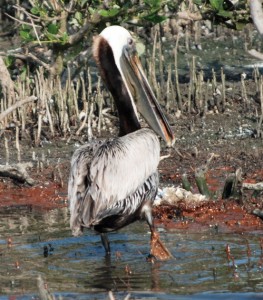I’m sure that if you belong to any environmental/conservation organization or if you have donated to causes in the past or perhaps simply visited a Website recently – you have received pleas for donations and/or instructions detailing ways you can assist the Gulf Coast in dealing with the impacts of the massive oil spill created and still being fueled by the blow out of British Petroleum’s (BP) Deepwater Horizon drill ship on April 20. I have received solicitations and/or announcements, through different venues, from The Nature Conservancy, Cornell Lab of Ornithology and NC Audubon. I have also seen dozens of other groups with online campaigns geared towards raising money for the Gulf Coast.
I know and you know groups like The Nature Conservancy, Audubon and the Cornell Lab of Ornithology do a lot of good work. Their resources afford them a place at the table when dealing with government bureaucracies and large corporations. But I often think of these and other large environmental groups as being a bit top heavy and wonder how much of the small donation I am able to give is eaten up in administrative, business as usual costs and how much gets to the heart of the problem.
With this thought in mind, I emailed the secretary of the Louisiana Department of Wildlife and Fisheries, Robert Barham. It just so happens that the secretary and I grew up about 12 miles apart in the farmlands of Northeast Louisiana – he in Oak Ridge and I in Mer Rouge. Barham’s reply was immediate, “We have a Foundation that assits our Department, and 100% of the money will be spent in LA to help the Department of Wildlife and Fisheries recover from this event.”
That Foundation is the Louisiana Wildlife and Fisheries Foundation (LWFF). LWFF is a “friends” organization like Friends of the Smokies that operates here in Waynesville. According to executive director Kell Mc Innis, LWFF was created in 1995 and “every dollar donated to LWFF is spent in Louisiana to assist the Department of Wildlife and Fisheries in their mission to protect Louisiana’s wildlife and fisheries resources.” Mc Innis also noted that you can earmark your donation specifically for oil spill mitigation. To do that, at this time, you need to download a donation form from LWFF’s Website at http://www.wlf.louisiana.gov/partners/foundation/ and check the box “in support of” and list oil spill. Mc Innis said that LWFF was working to update their online donation process to also allow this option.
Today the LDWF is working with state and federal agencies to assess habitat at risk from the oil spill, mobilize resources to try and protect habitat not already impacted and join in coordinated efforts to rescue wildlife and rehabilitate animals that can be saved. According to emails LDWF also, “…continues to work with BP officials to ensure the safety of Louisiana’s seafood.”
But today’s efforts may be only the tip of the iceberg. The email states, “Louisiana has faced many natural disaster storm events/hurricanes and the wildlife and fisheries resources have recovered in relatively short time spans. This man-made event, and the scope of the impacts it presents is a challenge beyond anything the state has seen from an environmental, economic and/or life changing perspective – especially for those in the fishing community.”
Mc Innis said that the long-term far-reaching effects of the oil spill make LWFF an especially good choice for your charitable donations because the foundation was created to assist Louisiana’s Wildlife and Fisheries and that is their singular mission.

